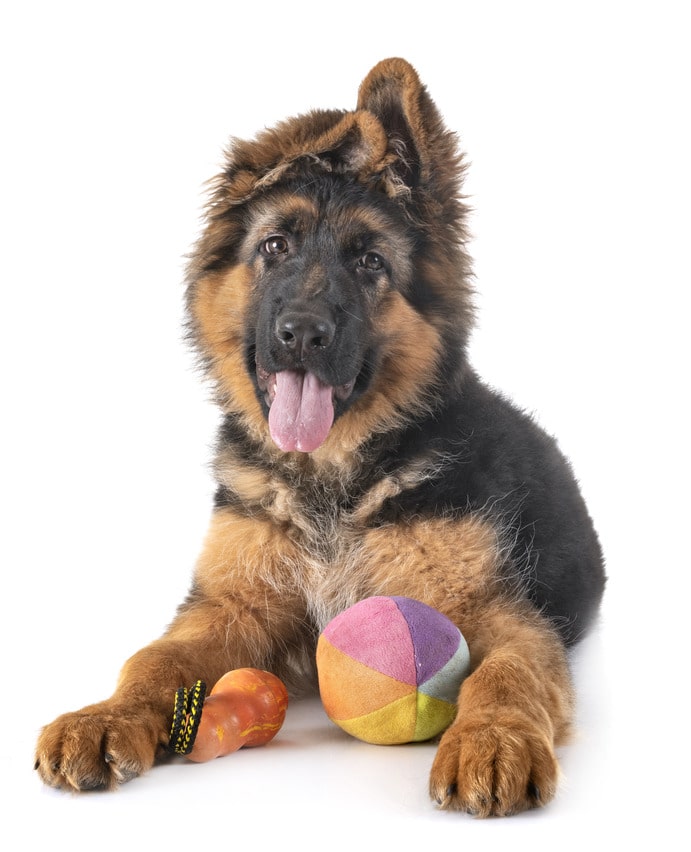

Training a German Shepherd Puppy | Everything You Need to Know
Training a German shepherd puppy through the first few weeks can be quite a hassle, but you can follow these steps to train your pup.
It is important to focus on German Shepherd Dogs (GSD) because trained dogs are a joy to be around. There is a reason why GSDs are the second most popular breed of dogs. You can bring out their great personalities going through puppy training.
Training from 8-16 Weeks
Goal: Socialization
The 8 to 16-week period is critical for socialization training for all puppies of every breed. German Shepherd dogs are protective of their owners, so it is important to make them see that strangers aren’t always a threat.
GSDs are observant; they tend to take in the owner’s reactions and cues when they experience new situations and people. These few weeks are critical were getting exposure to different people in easy, non-threatening situations will help them become confident around strangers instead of getting aggressive or fearful.
You can never overemphasize proper socialization because it will make up the foundation for the rest of their training. You need to focus on socializing the GSD puppy from a young age. It is critical for their mental development to expose the puppy to new smells, sounds, and sights in a safe and careful way. This will make them more confident instead of fearful.
During these weeks, the best thing you can do is to expose the puppy to different routines and life experiences from daily life. This will make them more adaptable when they are adults. For example, German Shepherds require regular grooming to make sure their skin and coat are healthy, and they don’t shed a lot. This means that they will be around groomers and tools like nail clippers, blow dryers, and more. If they are confident and nicely socialized, it can be great for them later on.
Goal: Crate Training
Going slowly is key here. With small breaks, treats, and toys, you can help them get over separation anxiety. You can also start with using your crate for feeding so that they become more acclimated to it. You need to do chores and errands sometimes, so it can be useful if the puppy is able to stay in the crate for around five to ten minutes.
Goal: Housetraining
To make sure your puppy is housetrained, crate training can be a useful tool. German Shepherd dogs are easy to train for the crate and pretty easy to house train. With consistency and supervision, you will definitely be able to hit the mark!
Training from 3-9 Months
Goal: Obedience Training
GSDs are definitely exemplary when it comes to their work ethic. With consistent and early training, you can help the best traits of your puppy come out. German Shepherds excel at obeying commands and their owners. You can start off by teaching the puppy some basic commands such as stay, down, and sit. GSDs can start leash-walking training at a young age too.
If you are unsure about how to go about obedience training, you can go to an obedience class. It can be helpful to learn about how to properly train your pup.
Goal: Recall
Now is the time to teach the puppy to come to you when you call it. While it can take some patience, practice, and time to reliably recall your dog, this is definitely worth it because it can make your life easier and can be quite helpful in emergency situations too.
Goal: Impulse Control
It is vital to focus on controlling impulses for any puppy ever. For GSDs, this is definitely super important because it can help you prevent problematic behavior. German Shepherds are prone to boredom, which can result in excessive chewing, digging, barking, and even chasing inappropriately. They have a natural prey drive, which makes them chase down cars and cats. But you can curb these behaviors through proper training.
Training a German shepherd puppy for impulse control means trying to get them to pay attention to you. You can do small things like getting your puppy to sit down before they get their food, play with their favorite toy, go for a walk, and more.
Training from 9-24 Months
The way dogs mature dependent on their size and breeds. They stay in their puppy phase for around a year old and don’t really reach that maturity of adult age before they hit two or three years. Males take even longer than female German Shepherds. By focusing consistently and working on their obedience skills, impulse control, and advanced training, it can make it easier for them to develop herding, tracking, scent work, agility, and protection work. You need to keep reinforcing these skills onto your dog throughout their life. This can make sure that you are getting the most out of their personalities and curbing problematic behavior.
German Shepherd dogs thrive on consistent and constant training and work. They actually love to have a job (or even multiple ones). If you allow them a chance to be challenged and work through their versatile and intelligent personalities, you will reap the rewards most definitely.
Training a German shepherd puppy is an important step to make sure your dog is healthy and great to have around your home. It will be better in the long term as well as for the home and family. Training will bring out good behaviors in your German Shepherd puppy.
Discover how to create a joyful, healthy home for your pet.
Subscribe to your weekly rundown of practice, real life ideas and training tips straight to your inbox.


